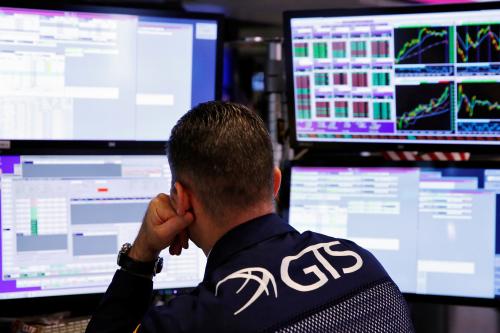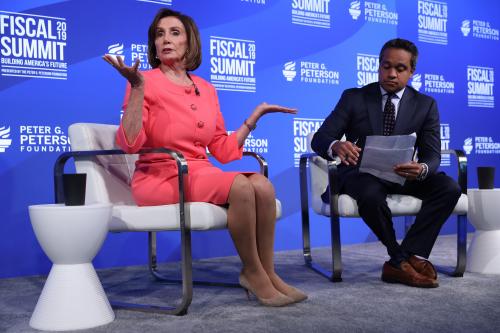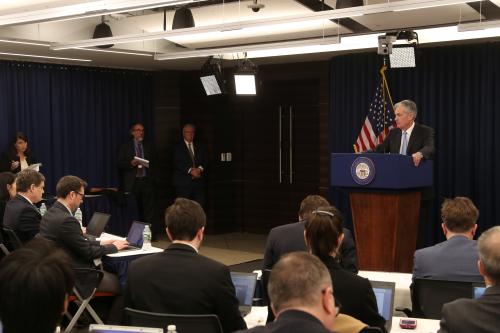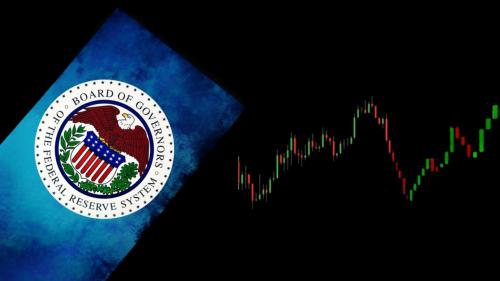This op-ed was originally published in Real Clear Markets on August 8, 2019.
At its most recent meeting at the end of July, the Fed lowered its benchmark interest rate by a quarter of a point. That action was somewhat surprising. Normally when times are good and the unemployment rate is at a 50-year low, the Fed raises interest rates as a defense against inflation. Economic models have shown that when the unemployment rate gets below a certain level, unless the Fed acts promptly, inflation will accelerate and be hard to contain. We are now well below that alleged danger point. Thus, for the Fed to cut rates when unemployment is at 3.7 percent and the economy is growing at a reasonable rate is almost unprecedented.
Why has the Fed shifted its strategy? First, because inflation remains subdued – well below the Fed’s target of a 2 percent rise. The failure of inflation to respond as expected to low unemployment has led many economists, including those at the Fed, to question or recalibrate the old models. One possibility is that the unemployment rate is not as good a metric of labor market tightness as it once was. As Danny Blanchflower argues in his new book, Not Working: Where Have All the Good Jobs Gone, there is still a lot of slack in the labor market when we look at other measures. Other changes in the economy – fewer unions, more global competition, an internet that makes comparison shopping easy, low expectations of inflation among businesses and consumers – suggest that inflation is not likely to accelerate to unacceptable levels any time soon.
With inflation subdued, the Fed can afford to focus more on the employment part of the Fed’s dual mandate. There is a social as well as an economic rationale for this emphasis. As Jared Bernstein and others have shown, tight labor markets are the best way to help less advantaged workers succeed and to insure a more broadly shared prosperity. As Chairman Powell put it in a July 16 speech, “Many people who have struggled to stay in the workforce are now getting an opportunity to add new and better chapters to their life stories.” In this context, the Fed’s leadership committee (the FOMC) is now engaged, for the first time, in doing a listening tour across the country to hear more directly from the constituencies they serve.
Beyond rethinking the old models, the Fed is concerned about looming head winds for the economy. These include fear of an escalating trade war, a slowing global economy, geopolitical uncertainties from a hard Brexit to conflict with Iran, and weak private sector investment. The current expansion is now the longest on record, kept going in part by recent tax cuts and spending increases that created a sugar high in 2018 and leading the Fed to throw a little lemon into the mix last year. But that recovery is now threatened by the withdrawal of the temporary stimulus. As former Fed chair, Ben Bernanke says, recoveries don’t die of old age; they usually get murdered. Chairman Powell doesn’t want to be the hatchet man this time around – withdrawing monetary stimulus at a time when fiscal stimulus is waning. Instead, the Fed seems to be worried that because interest rates are already so low, it won’t have much ammunition left should a recession occur. Better to be proactive and to act sooner rather than later in an attempt toprevent a downturn.
President Trump should be very happy with the Fed’s recent action. Instead he criticized the recent move as too small and announced new tariffs on Chinese goods. He has been pressuring Chairman Powell to reduce rates for a long time. He seems to understand what many economists and political scientists have shown, which is that elections often hinge on the state of the economy in the year before the contest. Should the economy begin to tank in the first half of 2020, that could affect Trump’s prospects.
The Fed has been very careful to maintain its independence and I am in no way suggesting that Powell is now reducing rates for partisan reasons. Nonetheless, his actions could affect the election. Voters tend to blame an incumbent President for any bad economic news on his watch. That’s not necessarily fair but it’s a fact. (It’s also a fact, as Alan Blinder and Mark Watson have shown, that Democrats have presided over more good economic times than Republicans through some combination of good luck and good policy while in office).
I am in no way suggesting that Powell is now reducing rates for partisan reasons. Nonetheless, his actions could affect the election.
Goldman Sachs, after doing a meta-analysis of all the historical data on the link between economic performance and electoral outcomes in the U.S. and combining that data with their own economic forecast, has predicted that the economy will still be growing at a steady pace in the first half of 2020 and that Trump will win under this scenario. On the other hand, his margin of victory is very small and the estimates involve a lot of uncertainty. In addition, according to Pew, views on the economy, like so much else, are now heavily colored by partisan identification. The state of the economy in 2020 may have less influence on people’s voting behavior than was true in the past. Trump supporters appear to believe that he can do no wrong; his opponents think he can do no right.
The Fed is in a difficult position. If they reduce rates, they risk being accused of reacting to White House pressures. If they don’t, trade and other head winds could push the economy into recession. A downturn or another financial crisis coming on top of an already fractured economy in which some people and communities are doing well and others have been by-passed, in which trust in institutions is crumbling, in which partisan rancor has exploded in response to the President’s tweets, would add economic distress on top of an already simmering pot of cultural and political grievances. A recession, in short, might cause the pot to boil over. Whatever the outcome of the 2020 election, that would not be good for the country.







Commentary
Op-edThe Fed’s rate cuts at 3.7% unemployment are almost unprecedented
August 13, 2019